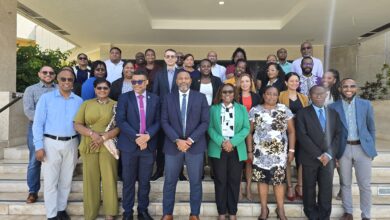Allow me at the outset to extend my congratulations to you on your leadership of the Security Council during the month of February. Your diplomatic skills and gracious style have obviously ensured smooth and effective handling of the various matters which have come to the Council. I had the pleasure of visiting your great country just over a week ago and was impressed by its progress and its economic development as well as its strong support for multilateralism and the international system.
I wish to thank you and the Council for acting promptly on my request to convene this meeting. I am pleased to see the Secretary General who I know has a keen interest in this matter.
My delegation has come before the Security Council, on behalf of the Caribbean Community (CARICOM), to call the urgent attention of the international community to the rapidly deteriorating situation in Haiti. The situation has now reached crisis proportions, given the continuing breakdown in law and order, the rising insurgency and conditions of sheer anarchy and chaos, as well as a worsening humanitarian crisis which, in turn, has caused displacement of the population, resulting in increasing numbers of refugees pouring out of the country.
As the members of the Council are aware, during the past weeks, the political upheaval in Haiti has escalated, with heavily armed groups using force to extend control over parts of the country. Already, they have managed to seize all the cities along the northern parts of the country and it is now our understanding that they will seek to advance even further, with the intention of marching on the capital, Port-au-Prince within the next few days.
The already weakened and outnumbered Haitian National Police have been forced to abandon their posts or to protectively barricade themselves against the mounting attacks of the rebel groups. In the latest flare-up of violence, some 70 persons have been killed. The prevailing situation within Haiti can no longer be viewed as just an internal matter. The current situation now poses a serious threat to regional peace and security, given the outflow of refugees which threatens to overwhelm the resources of states in the region.
The past twenty months have been particularly challenging without much progress towards ending polarization and building a political consensus. The result is that the country is now locked in a political stalemate as a result of the steadfast refusal of the opposition to engage in a process of dialogue mandated by the CARICOM Action Plan.
Given Haiti’s status as its newest member, CARICOM has been concerned with the developments in that country, and has sought to provide its good offices on numerous occasions to bring a lasting resolution to the crisis. We have maintained that adherence to the following principles is critical:
* the full application of democracy in Haiti
* non-acceptance of a coup d’etat in any form; and
* any change in Haiti must be in accordance with the Constitution of Haiti.
The situation of Haiti is a serious regional concern. It is important to note that in keeping with Chapter VIII of the Charter regional organizations are often the first recourse in addressing threats to peace and security. Following the coup d’êtat against President Aristide in 1991, CARICOM, as the directly relevant sub-regional Organization, has participated fully in the ongoing efforts of the OAS and the United Nations to restore peace and stability to Haiti, including through the provision of civilian and military assistance
The most recent CARICOM efforts, initiated in early January this year, have included fact-finding missions to Haiti and meetings with the President of Haiti, Jean Bertrand Aristide and with the Opposition. CARICOM’s initiative outlining proposals for moving the process forward was presented at a meeting held in Nassau, the Bahamas, on January 20-21 with the major political stakeholders. The Opposition undertook to discuss the document internally. At CARICOM’s invitation, observers from the US, Canada and the OAS participated in the Nassau Meeting.
On 31 January, Prime Minister Patterson of Jamaica, in his capacity as Chairman of CARICOM, hosted a meeting with President Aristide in Kingston. We were again joined by our international partners, this time including the European Union. This meeting produced the CARICOM Prior Action Plan which President Aristide accepted. It involved certain measures to improve the security climate and to build confidence generally. These include compliance with previous OAS resolutions, negotiation of rules for demonstrations, the release of detainees, disarmament of strong-arm groups, the strengthening of the police force and the enjoyment of fundamental freedoms.
The Plan also envisaged the establishment of an Electoral Commission, the formation of a Council of Eminent Persons, as well as the appointment of a neutral and independent Prime Minister. It further calls for the formation of a new Government through a process of consultations between the Prime Minister, the President and the Council. Emanating from a subsequent meeting in Washington, with the participation of the U.S Secretary of State, the Foreign Minister of Canada, the Secretary General of the OAS and the Permanent Observer of France to the OAS, a Plan of Action was drawn up to facilitate implementation of the CARICOM Prior Action Plan.
The Plan was accepted by President Aristide but has been rejected by the Opposition. Members of the Council will well appreciate that it is impossible to make meaningful progress unless both sides are willing to play their part. The fact is that there are some steps which the President cannot take alone, as they require participation by the Opposition and other stakeholders.
The situation we now face is completely different from that which began as a political impasse, over exercise of rights and the role of opposition groups. The more recent incursions by heavily armed “rebel” forces from the north have resulted reprisal killings, the destruction of property, and general lawlessness, creating a state of anarchy in much of the country. As Prime Minister Patterson indicated in a letter to Secretary General Kofi Annan last week, immediate action is needed to safeguard democracy, to avert bloodshed and a humanitarian disaster.
In response to the rapidly deteriorating political situation in Haiti, the Government of President Aristide has requested the international community to assist in the restoration of security, order and the rule of law within his country. Specifically, and given the likelihood of the “rebel” forces reaching the capital, CARICOM has been requested to garner support in the strengthening of the Haitian National Police, with the possibility of participation in a multinational force in Haiti.
While CARICOM will continue to play its role in seeking a political solution to the crisis in Haiti, we believe the United Nations has a special responsibility in assisting Haiti, given its record of involvement in previous peace-keeping missions. The restoration of peace and stability should be considered as part of its unfinished business.
In this context we welcome the appointment by the Secretary General of a Special Advisor to coordinate and promote greater UN engagement in dealing with the current crisis.
The United Nations past active involvement in Haiti highlights a historical recognition of its responsibility to assist in finding a solution to what has been an intractable situation for a prolonged period. The United Nations role has had a significant impact on attempts in the past that have been deemed relatively successful in stemming the downward spiral and in bringing the parties to the negotiating table. There is no doubt that the volatile situation in Haiti today and the potential for further chaos is not only a threat to the peace and security of the region but, of necessity, must be of great concern to the international community.
It is against this background that the Member States of the CARICOM Community seek the direct and immediate intervention of the United Nations in Haiti. The situation is one of utmost urgency and the need for decisive action is paramount.
The immediate need now is for the Security Council to authorize the urgent deployment of a multinational force to assist in the restoration of law and order, to facilitate a return to stability and to create an environment in which the continuing efforts to find a solution to the political crisis can be pursued. Such international support would be important to prepare the ground for parliamentary elections and for a presidential election when due. A solution is vital for the short and long term future of Haiti which is so seriously endangered by the escalating insurgency and the prospect of a bloody civil war. The Council should authorize the creation of a Force to do this and to encourage participation by those states with the available resources.
I wish to the Council that some members of CARICOM have already indicated a willingness to contribute to the Force within their individual capacities. All members of the international community should do their part.
I should stress, Mr. President that CARICOM’s stand on this issue is not driven by any desire to promote the political interests of any particular personality in the Haitian political arena. It is based on the need to remain faithful to democratic principles and the integrity of a constitutional order.
CARICOM also calls upon the Security Council to endorse urgent action by the international community to address the growing humanitarian crisis and the need to extend assistance including through the delivery of international aid for a smooth transition to long-term economic and social reconstruction.
In the light of the growing surge of refugees to neighbouring States, it is also imperative that the States affected be provided with the requisite resources to offset costs for the provision of relief and humanitarian assistance to the refugees.
It is a cruel twist of fate that the first free Black republic in this hemisphere has had such a long and difficult history of struggle to protect that very freedom. It is an even more cruel irony that, in this the bicentenary of the commemoration of the historic event that marked the end of their struggle and the beginning of a new era of freedom, the people of Haiti are today vastly removed from the goals for which they valiantly fought to achieve – political freedom, economic prosperity and social stability.
Let us collectively determine to again come to the support of the valiant though long-suffering people of Haiti in their hour of need, and to meet their urgent requirements at this critical time. The people of Haiti need help. We are here seeking help.
Jamaica Information Service
Kingston, Jamaica
2 March, 2004





